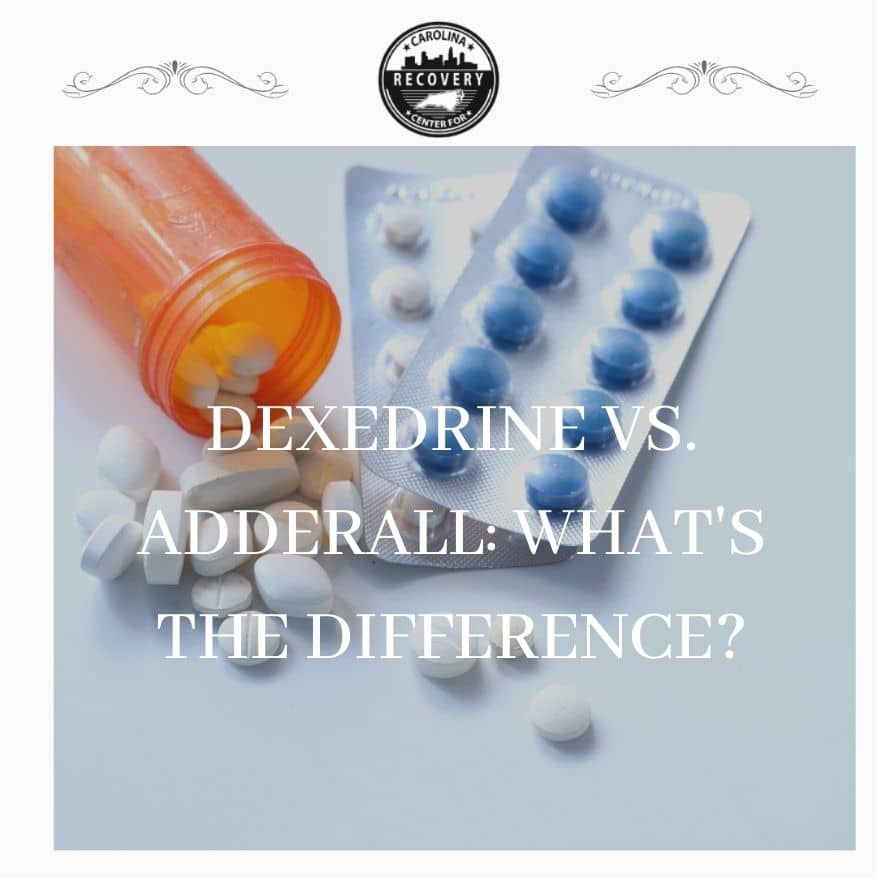Dexedrine vs. Adderall: What’s the Difference?

Medically Verified: 2/1/24
Medical Reviewer
Chief Editor

All of the information on this page has been reviewed and verified by a certified addiction professional.
Attention deficit hyperactivity disorder (ADHD) is the most common mental health condition to affect children affecting about 9.8% of children ages 3-17 years.[1] The symptoms of this condition include an inability to pay attention, hyperactivity, and impulsivity. ADHD treatment requires a combination of prescription medications and behavioral therapy.
When it comes to medications for ADHD, people are usually given some form of a stimulant drug. The types of stimulant medications used to treat this condition include methylphenidate drugs like Ritalin or Concerta and amphetamines like Adderall or Dexedrine.
What is Dexedrine?
Dexedrine is the brand name for a drug known as dextroamphetamine. This medication belongs to the amphetamine family and is usually prescribed to treat ADHD or sleep disorders like narcolepsy. While this medication can help individuals with ADHD focus and remain calm, this drug has a potential for addiction if abused.
Because of the potential for abuse, Dexedrine is a Schedule II drug under the Controlled Substances Act. This means that this medication has medicinal value, but it also has abuse and addiction potential. Because of this, Dexedrine may not be the best medication for people with a history of addiction.
The common physical side effects associated with Dexedrine include:
- Restlessness
- Headache
- Dry mouth
- Unpleasant taste in the mouth
- Excessive shaking
- Diarrhea or constipation
- Changes to appetite
- Weight loss
The high-risk side effects that are common among individuals who abuse this substance include:
- Racing heartbeat
- Chest pain
- Shortness of breath
- Slowed speech and difficulty speaking
- Feeling very tired
- Dizziness or fainting
- Feeling numbness or weakness in the arms or legs
- Rapid mood changes
- Abnormal movements
- Changes to vision
- Seizures
Dexedrine works by affecting two central nervous system neurotransmitters known as norepinephrine and dopamine. People who have ADHD have an imbalance in these neurotransmitters, causing them to suffer from inattention, impulsivity, and hyperactivity. Increasing the production of these chemicals is what causes them to focus better and remain calm.
What is Adderall?
Adderall is the brand name for a medication that contains amphetamine and dextroamphetamine. Like Dexedrine, Adderall is used to treat ADHD and sleep conditions like narcolepsy. Also similar, Adderall is successful in treating those conditions, however, there is a potential for abuse and addiction tied to this medication.
Adderall is a Schedule II drug according to the Controlled Substances Act because of its medicinal value and propensity for abuse. People who suffer from a history of addiction might not be good candidates for this medication.
The common side effects of Adderall include:
- Dizziness
- Restlessness
- Headaches
- Nausea
- Diarrhea or constipation
- Changes in appetite
- Weight loss
- Dry mouth
There are more serious side effects associated with Adderall, however, they are more common in individuals who abuse the medication. If someone experiences the following side effects, they should contact emergency medical services immediately:
- Vision changes
- Chest pain
- Rapid heartbeat
- Arrhythmias
- Difficulty breathing
- Extreme dizziness that causes fainting
- Weakness or numbness in the body
- Skin rash
- Swelling in the face, tongue, or body
- Trouble swallowing
- Difficulty speaking
- Seizures
Adderall affects both the central nervous system and the peripheral nervous system. This means that the medication can affect nerve endings throughout the body. Additionally, Adderall predominantly affects dopamine, which causes feelings of calmness, improved mood, focus, and stimulation.
People who have ADHD and use this medication will experience an increase in focus and a decrease in hyperactivity and impulsivity. However, this medication has the opposite effect on individuals who do not have ADHD. People tend to abuse this drug because it can cause a high similar to that of cocaine or methamphetamine when ADHD is not a present disorder.
The Differences Between Dexedrine and Adderall
While Dexedrine only contains dextroamphetamine, Adderall contains both dextroamphetamine and amphetamine. This is one of the main differences between the two medications.
This difference in chemical compounds causes Adderall to affect the brain and body differently than Dexedrine. While Dexedrine only affects the central nervous system, Adderall affects the CNS and the peripheral nervous system.
Another difference between the two medications is that Adderall focuses on dopamine reuptake while Dexedrine focuses on increasing the production of both dopamine and norepinephrine.
Both substances have a high risk or possibility of causing dependency and addiction. Because of this, individuals who suffer from substance abuse issues should avoid taking these medications.
Are there Non-Stimulant ADHD Medications?
There are two types of non-stimulant ADHD medications that can be prescribed to individuals who have a history of addiction or stimulant abuse in particular.
The first type of non-stimulant medication is known as a norepinephrine modulator. These medications include Strattera (atomoxetine) and Qelbree (viloxazine).
The other form of non-stimulant ADHD medication are known as alpha agonists. According to the National Library of Medicine, these medications work for ADHD by stimulating the “alpha2 adrenergic receptors in various parts of the nervous system, particularly the prefrontal cortex.”[2] These medications include Catapres and Kapvay (clonidine) or Tenex and Intuniv (guanfacine).
Finding Help for ADHD Medication Abuse
Many ADHD medications are stimulants, a type of drug that is known for its propensity for abuse. If you or a loved one abuses prescription stimulant medications, it’s time to seek professional help. Abusing these drugs can lead to an array of issues, including life-threatening overdoses, but treatment can help you recover.
Carolina Recovery Center today for more information on our substance abuse treatment program.
References:

